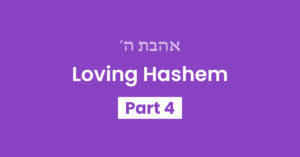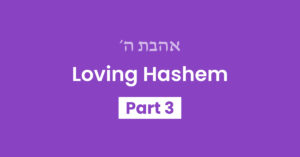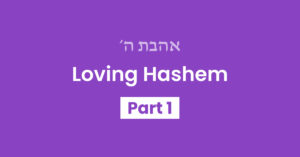We’ve been learning about the middah and mitzvah of Ahavas Hashem. So far, we explored how one way to increase our love for Hashem is by noticing all the amazing things He does for us. When we notice how much good Hashem does for us, we will be filled not only with gratitude but also with a deep sense of love.
Why does it fill us with love in addition to gratitude? Because we realize that Hashem’s gifts to us are part of an ongoing, everlasting, close relationship that Hashem is trying to forge with us. Hashem does not just give us a few gifts and then walk away; rather, He gives us a constant, never-ending stream of gifts because He cares about us, and wants us to be forever connected to Him in a loving, close relationship.
While focusing on all of Hashem’s gifts is indeed a powerful way to feel more love towards Him, there is another way to develop an even deeper sense of love for Hashem. And that is by thinking about how very much connected we truly are.
Why Do You Love Me?
Imagine that you have a 6-year-old daughter, and you ask her if she loves you. “Of course I love you,” she says. “I love you because you give me lollipops and ice cream and let me climb on the monkey-bars!”
How would that make you feel?
On a simple level, you would probably find her response to be cute, and you might even give her a hug. But on a deeper level, this kind of love is missing something very essential. Your daughter here is thinking only about what pleasures you give her. But that is a “conditional” type of love. What if one day you would lose all your money and be unable to buy her lollipops? What if your schedule would change and you would no longer be able to bring her to the monkey bars? Does that mean she will stop loving you?
Hopefully, if your daughter is healthy and mature enough, the answer is no – she will not stop loving you. Because hopefully, even if she cannot articulate it, there is something else deep down that is making her love you, and making you love her back. What is that deep thing? It is your shared sense of connection. You gave birth to her, so her existence is a direct outgrowth of yours. If not for you, she would never have been born. There is an eternal bond connecting you and your child, that can never be broken.
Loving a child comes from your shared sense of connection.
That sense of everlasting, deep connection is what provides an even deeper, more secure, unconditional type of love – a love that cannot ever be broken.
Applying It to Hashem
What does all this have to do with Hashem?
The Maharal explains: We naturally tend to think that Hashem is in the Heavens, and we are low down here on earth. With that perspective, it’s hard to feel connected to Hashem and hard to love Him. But the truth is that we are forgetting something very essential: our entire existence is dependent on Hashem. We cannot exist without Him. Every breath we take and every step we take is only because Hashem is choosing to “pump energy” into us at that very moment.
If we think about it, this is an even more extreme and close connection than the connection that a parent has with a child. Yes, you only came into existence because your mother gave birth to you, but now you exist as an independent entity. If something would ever happen to a parent chas veshalom, the child could still continue to exist on its own. But when we say that Hashem created You, it doesnt mean that He created you and then left you to fend for yourself. Every moment of your existence is dependent on Him. And that means that there is a constant, everlasting connection and closeness between you and Hashem.
There is a constant, everlasting connection and closeness between you and Hashem.
When we focus on that extreme closeness and connection, we can begin to feel a loving sort of closeness with Hashem, for He is the Source of our existence.
“Shema… Hashem Echad”
With this understanding, we can now understand why we say the passuk of “V’Ohavta – and you should love Hashem…” right after we say “Shema… Hashem Echad – Hashem is one.”
The Gemara1 relates that when the Romans brought out Rabbi Akiva for public execution, Rabbi Akiva demonstrated his deep love for Hashem by crying out, “Shema Yisrael, Hashem Elokeinu Hashem Echad!” – and he lengthened the word “Echad (one)” until his neshama left his body.
What is the connection between “Hashem is One” and the mitzvah of loving Hashem?
The Maharal2 explains: “Hashem Echad” means that we recognize that Hashem is the ONLY true existence in this world, and in all worlds. Everything – and every single one of us – is dependent on Hashem in order to continue to exist. When we recognize this Oneness of Hashem, we are able to fulfill the next passuk of “V’Ohavta” – the mitzvah of Loving Hashem. (Interestingly, the Hebrew words “Ahavah (love)” and “Echad (one)” both have the gematria of 133.)
With this understanding we can now also understand why the sefarim4 say that every Jew is born with a “natural” love for Hashem – as it says in Shir Hashirim, “[Even] great waters cannot extinguish the love.” From the moment we were born – in fact – from the very first moment that our souls came into existence – there was created a natural, everlasting bond of love between us and Hashem because He is the one who brought us into existence and continues to enable us to exist.
Every Jew is born with a “natural” love for Hashem
This week, let’s try to awaken our inborn love of Hashem by remembering that He is the Source of our existence every single moment, so He is very closely connected to us at all times.
Sources: [1] Brachos 61b; [2] Maharal Nesivos Olam, Netiv Ahavas Hashem; [3] See Sfas Emes Noach 631; [4] See Sfas Emes Tzav 641 and Vaeschanan 634
Your Challenge
Once a day, do something to demonstrate your recognition that Hashem is so infinitely close to you at all times, and that He is the Source of your existence.
FOR EXAMPLE:
- Before climbing the stairs, say, “Thank you Hashem for enabling me to climb the stairs! I know I can only do it because You are right by my side, giving me energy to move my feet.”
- Before saying a bracha, think about how Hashem is creating this food right now for you to enjoy, and enabling you to chew it and taste it.
Torah Questions
- According to Rashi (Yeshayahu 41:8), Avraham Avinu came to recognize Hashem out of his love for Hashem, whereas Yitzchak and Yaakov knew Hashem from _____?
- According to Rashi on Devarim 6:5, what does it mean to love Hashem with all of our hearts? (Give at least 1 of Rashi’s 2 explanations.)
- According to Rashi on Devarim 6:5, what does it mean to love Hashem with all of our soul?
- According to Rashi on Devarim 6:5, what does it mean to love Hashem with all of our “me’od”? (Give at least 1 of Rashi’s 2 explanations.)
- Fill in the blank: In Devarim 10:12, Moshe Rabbeinu says to the Jewish People: “And now, Yisrael, what does Hashem ask of you? Only to fear Hashem, to _____, and to love Him and to serve Hashem with all your heart and soul.”
- According to Pirkei Avos 1:3, we should not be “like servants who serve their Master (Hashem) on condition that ______”?
Questions to Ponder
- The Orchos Tzaddikim writes that a person cannot truly love Hashem unless he is totally focused on fulfilling all the mitzvos. Anyone who does not know mitzvos cannot be said to love Hashem. Why do you think this is true? Why can’t you just love Hashem in your heart, but not be particularly careful in keeping all mitzvos?
- The Orchos Tzaddikim writes that Ahavas Hashem (love of Hashem) can actually lead to Yiras Hashem (fear of Hashem). Can you think of an explanation for how this works?
- The Gemara says that someone who marries his daughter to a Talmid Chacham, does business for and benefits Chachamim from his property, then the Torah considers it as if he is clinging to the Shechinah (Divine Presence). How do these actions show love of Hashem?
- The Maharal writes that only Jews can love Hashem, whereas gentiles can only fear Hashem, but not love Him. Why do you think this is so?





